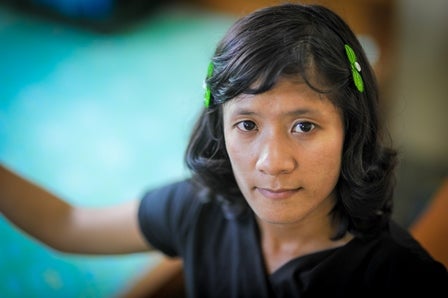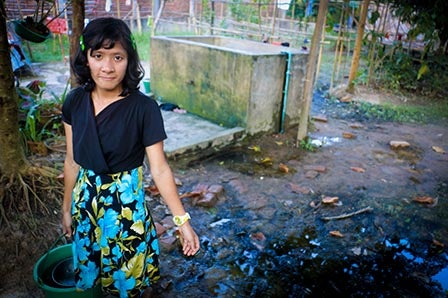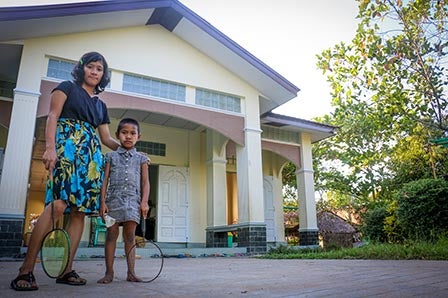At first glance 19-year-old Chan Chan looks just like any other teenager. She stands only five feet tall and with the green hair buckles tied on either side of her face and her blue and black flower patterned dress, she could easily be mistaken to be younger than she is.

Despite delicate appearance, she carries herself with self-confidence and poise that hide a secret not too many people know of.
She has HIV/AIDS. Despite having contracted HIV at the young age of nine years old from an injection using a used syringe at a local clinic in her native state of Rakhine, she does not see her life as hopeless. On the contrary, she’s a fighter and has fully accepted it and openly says that she takes a positive attitude in having HIV/AIDS, because it changed her perspective on life.
“I want to tell to all the young people that even if you are living with HIV/AIDS, it does not make any difference to who you are. You are just a young person full of potential and we can still achieve many things despite living the disease,” said Chan Chan. “Since contracting the disease I have gained a lot of knowledge and I have met a lot of people.”
HIV/AIDS is still considered a taboo subject in Myanmar and as a result of the stigma attached to the disease many people delay or avoid getting tested. Others receive treatment much later than they should.
On a global scale 35.3 million people live with HIV/AIDS. In Myanmar the official number lists 215,000 people with the country living with HIV/AIDS, but that number is in reality much higher and it is expected to rise in the coming years as the population becomes more mobile due to the country’s on-going socio-economic transformation. Approximately, according to 2012 official data, 80 percent of those who need ART treatment receive it.
Contracted HIV through a used needle

Chan Chan who is ethnic Rakhine or Arakan grew up in Tha Byu Chaing village, a stone’s throw from Rakhine State’s famous white sandy beaches of Ngapali. Her father is a fisherman and her mother runs a small grocery shop at the local market to help support the family’s income. Chan Chan also has a younger brother. She is the only in the family which has been infected with HIV/AIDS.
“Whenever I got sick we had to go and see the village medical officer. At that time, people in my village did not know much about HIV/AIDS. At the medical clinic, syringes were often reused due to a lack of education or knowledge on the danger of contagion. I was only nine when I was infected,” recalls Chan Chan.
Growing up with HIV/AIDS was very difficult for Chan Chan and her family. They constantly struggled to make ends meet as the anti-retroviral therapy (ART) medication for Chan Chan was not free, nor was it freely available in her area. There were even times when Chan Chan had to forego medication and as a result she became very weak and needed frequent blood transfusions in Yangon.
When I was thirteen I needed another blood transfusion, but my parents did not have enough money to go to Yangon to pay for one. On the radio I had heard that HIV/AIDS was a deadly disease and I was sure that I was going to die from it. However my mother assured me that as long as she was alive, she would never let that happen,” says Chan Chan describing the vivid memory that day left in her mind.
As she grew older it became more and more difficult to obtain the needed ART medication in her hometown, forcing Chan Chan and her mother in 2011 to move to Yangon with the hope of finding a place that would provide her free ART services. They contacted Phoenix, one of the few known HIV/AIDS networks, and, much to their relief, they learned about Pearl Metta (Pale Myitta) an orphanage in the outskirts of Yangon where HIV/AIDS affected children could receive the needed ART medication for free.
UNFPA supports her dream of becoming an Advocate for HIV/AIDS
At the Pearl Metta orphanage Chan Chan dedicates most of her time mentoring the other children with their schooling as well as offering counseling. Due to her ill-health she was forced to drop out of school and only completed ninth grade. Her ambition is to attend university and become an advocate for HIV/AIDS related issues for the young people living in Myanmar.
"Despite my illness I want to go to university and become an educated person, so that I can help others. I did not give up my life when I found out I had HIV/AIDS, and I strongly believe that there is no reason to give up on your hopes just because you are living with the disease. Also I do not think myself as the only one living with HIV/AIDS. I keep telling myself that I can do it and I live each day thinking what is next and what I should do achieve next."
Since her move to Yangon, Chan Chan has been heavily involved in HIV/AIDS awareness raising activities. In 2013 she joined the Myanmar Youth Star Network, which consists of a group of affected persons living with HIV/AIDS. Here she underwent training on how to become a peer-educator for other affected youth living with the disease.
In September 2013, she was selected to attend ‘Youth Leadership Training’ organized by the Myanmar Youth Star network with support from UNFPA. The leadership training focused on issues relating to sexual reproductive health and rights, and HIV prevention measures.
“Before I attended the UNFPA supported training, I had no idea what ‘leadership’ meant. As a result of the training, I realized that I do have the abilities needed so that I can actively contribute to my community. I can be somebody who can help people around me in so many ways, even though I was once discouraged, discriminated and looked down upon simply because I have HIV/AIDS. I want to be their voice,” said Chan Chan,
Her message to all parents
Chan Chan said she and her mother sometimes argue over her choices, but that she always appreciates knowing that her parents only want the best in life for their children. “My mother wants to control everything, especially about my brother. I keep telling her to let him be the way he is. Parents want the best for their children and worry about everything. We, young people, do what we want to do. We need a balance between them. I think we need an open talk between parents and children. Parents should explain better their reason instead of saying ‘you must do it’,” said Chan Chan.
Hopes and fears for the future

Growing up in a rural community with lack of access to basic health care, especially when it comes to awareness and treatment for HIV/AIDS and related diseases, she has decided to help the people living in her community and who need ART. “My dream is big. I want to change the people’s perspective on HIV/AIDS. Discrimination towards HIV affected persons is still there. I want to educate the people in my community through the health education and behaviour change communication sessions. And most of all, I hope everyone in my community have access to free ART and blood test services.
Chan Chan says she worries for her future due to her low education level. “I am weak in English. Due to my ill health, I cannot prepare for the matriculation examination. Sometimes, I feel discouraged when I have to introduce myself and tell others about my education status workshops or conferences. Others are usually either graduates or university students.” She added that one of her goals is to help young people living with HIV/AIDS gaining better access to education. “I have met a lot of young people who have to sacrifice their education and work for the family’s survival. Some of my friends are also interested in attend leadership and capacity building trainings, however they do not have time for that, as they have to work very hard just to make ends meet,” she said.
Her dream of becoming an advocate by educating and changing people’s perceptions about HIV is on-going. “We need more education programmes on preventative measures, including increase media coverage on the issue so that people across the country will get a better understanding of HIV/AIDS, so that they too can take part in combating it,” said Chan Chan. “I believe can do something meaningful for others and I would like to urge all the young people who are just like me, to think what we want to achieve in our lives. We need to think of one achievement after another instead of focusing on our situation and weaknesses.”
The UNFPA is focusing on prevention of HIV/AIDS through sexual transmission amongst young people, women and most at risk groups such as female sex workers, men who have sex with men (MSM) and people who inject drugs. The UNFPA is contributing US$5.8 million to the Myanmar HIV/AIDS country programme and covers one third of the country’s need for contraception.
On a nation-wide scale UNFPA supports, under its 3rd country programme and HIV prevention project, the comprehensive condom programme (CCP) which covers 34 townships and 32 townships for the HIV prevention of mother to child transmission programme (PMCT).
***
– Article by Malene Arboe-Rasmussen
– All photo credits: Ben Manser/UNFPA Myanmar



